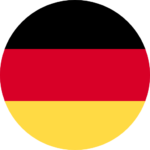Germany
Languages spoken in Germany: German.
Geopolitics and current affairs in Germany
The political scene in Germany has entered the last phase of the era of Angela Merkel, the Chancellor since 2005, who left the leadership of her party, CDU, in October 2018. She announced that she will not renew the mandate once her term of office ends in 2021. The coalition between the CDU/CSU and the Social Democrats of the SPD has encountered several difficulties. After some confrontations, the elections in Bavaria in October 2018 made the Bavarian CSU party fall back. In the months that followed, the country was overwhelmed by fears about the rise of extreme-right groups, especially after the murder of Walter Lübcke (CDU), a politician who had proposed measures of solidarity with migrants. However, in the European elections of May 2019 the real winners were the Greens, who doubled the number of votes up to 20.5%, while the CDU/CSU, although downsized, was confirmed as the first party with 28.9% of the vote. The real defeat was suffered by SPD, which hit a record low of 15.8%, and risked its permanence in the government coalition. AfD populists, who increasingly moved to xenophobic positions, did not break through (11%).
Annegret Kramp-Karrenbauer, appointed as Merkel's successor, replaced Ursula von Der Leyen as Minister of Defence on 17 July 2019, who in the meantime became elected President of the European Commission. On 22 January 2019, Germany renewed the Elysée Treaty with France, deepening bilateral relations. However, the clash with Italy on the management of migration flows continues.
Boundaries of Germany
Germany borders with Denmark on the North; Poland and the Czech Republic on the East; Austria on the Southeast and South; Switzerland on the Southwest; France, Luxembourg and Belgium on the West; the Netherlands on the Northwest; and the Baltic Sea and the North Sea on the North. The territory includes the northern side of the Alpine chain between Lake Constance and the Salzach River on the South: the rugged wooded hills slope down into the undulating Swabian-Bavarian plateau. The central area of the country is formed by a mountainous region, interrupted by basins that open the way to the northern plain. North of the Danube, the central reliefs (Thuringian Forest, Franconian Alb, Swabian Alb, Black Forest) are arranged in a crown around the Swabian-Franconian basin, crossed by the rivers Neckar and Main. Between the Black Forest and the French Vosges is the Rhine Valley. To the East, the Thuringia and Saxony basins extend from the Ore Mountains down to the northern plain. In the Northeast, the plain is intersected by a dense river network formed by the Elba and its tributaries to left (Saale and Mulde) and right (Havel).
The coasts are low and dune, faced by shoals or festoons of islands (East Frisian) and engraved by the deep estuaries of Elba, Weser and Ems.
The climate is intermediate between the oceanic climate of north-western Europe and the continental climate.
Germany's exclave in Switzerland is the municipality of Büsingen am Hochrhein (7.62 sq. km; 1443 inhabitants in 2017); and in Austria, municipality of Jungholz (7.06 sq. km; 301 inhabitants in 2018).
Form of government
Having been defeated and divided since the Second World War, Germany regained its unity following the disintegration of the communist regimes in Eastern Europe: on 3 October 1990 the German Democratic Republic (DDR, established on 7 December 1949 in the Soviet occupation zone) ceased to exist and its territory became part of the Federal Republic of Germany (BRD, established on 23 May 1949 in the territories occupied by the USA, France and the United Kingdom), according to the procedures set out by the Basic Law of 25 May 1949 (Grundgesetz) and the State Treaty signed by the two Germanies on 31 August 1990. After the reunification, the BRD is made up of 16 confederate states (Länder), each of which has its own legislative and executive bodies. While the former DDR was subject to the communist regime, in the BRD Christian Democrats (CDU) and Social Democrats (SPD) took turns leading the government.
According to the Grundgesetz, the executive power is vested in the Chancellor and his/her ministers, while the legislative power is carried out by the Parliament, composed of 2 Houses with different powers: the Bundestag (Federal Diet, 598 members elected by direct suffrage with a 4-year term of office: in fact their actual number varies in each legislature (currently 709) because the parties can earn supplementary seats in the constituencies) and the Bundesrat (Federal Council, 69 members appointed by regional governments according to their population). The Chancellor must have the confidence of the Bundestag and may not be dismissed without the appointment of his/her successor ("constructive distrust"). The Federal President is elected for five years by the members of the Bundestag and by as many voters designated by the Länder Diets in proportion to their political weight.
Translation agency for German
Are you thinking of expanding your market and selling your products and services in Germany? Our translation company specializes in translations of any type of content from Spanish/English into German… We offer technical translation services -English-Spanish, legal translations German-English-Spanish, website translation German-English-Spanish, or subtitle and captioning translation German-English-Spanish. Our professional translators are familiar with the in and outs of the language spoken in Germany, and you can always be sure that your message will properly reach your users in this territory.
